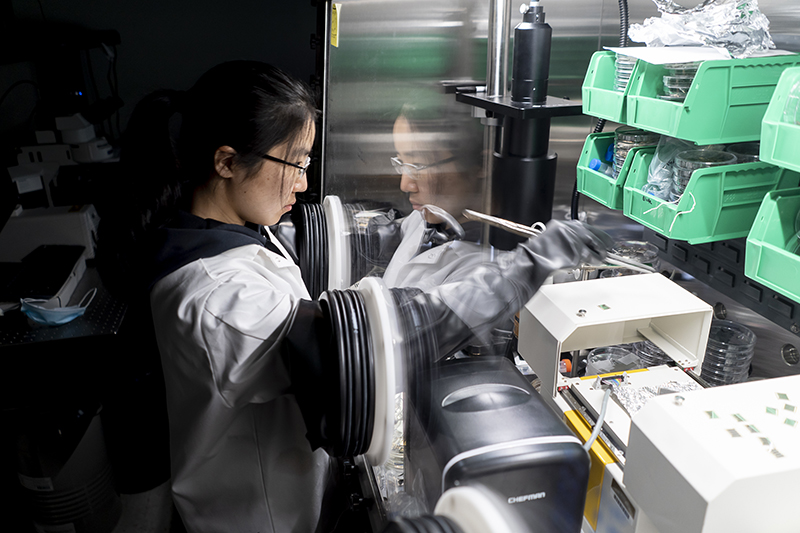January 18, 2023
Purdue Engineers Improve Solar Cell Efficiency and Stability

WEST LAFAYETTE, Ind. – Purdue University researchers have created new, multifunctional ligands that improve the charge transfer, power conversion capability and long-term stability of perovskite solar cells.
Perovskite is a material that can be formed from different elements to have a variety of electrical, optical and physical characteristics. Perovskite can be manufactured as solar cells with simple techniques similar to printing newspapers; the techniques cost less and use less energy than those used to produce traditional silicon cells. Perovskite solar panels are also much thinner and lighter than silicon panels, making the transportation and installation cost lower. They can be made lightweight and mechanically flexible and portable. But Letian Dou, the Charles Davidson Associate Professor of Chemical Engineering in the Davidson School of Chemical Engineering, said perovskite solar cells have traits that limit their effectiveness.
“These solar cells lack an effective charge transfer and are unstable and vulnerable under prolonged light exposure, which often leads to degradation,” Dou said. “Poor stability means a shorter product lifetime, and consumers will need to replace a panel more frequently. Perovskite may not be stable for 25 years like silicon, but at least 10 years is required for successful commercialization. Replacing the panels also adds to the labor cost.”
Dou said traditional solar cells require a critical interface between perovskite and the organic charge collection layer. He said a molecular “glue” is needed, but conventional molecules block the current flow.
“Our conjugated ligands have a perfect fit into the perovskite crystal lattice and can help build a 2D-on-3D perovskite heterostructure, which further enhances the solar panel’s stability,” Dou said.
Dou and his team have tested the innovative ligands in their laboratory.
“We achieved near 25% power conversion efficiency with the ligands, compared to less than 20% without them,” Dou said. “We also improved the lifetime to more than 2,400 hours tested at 65 degrees Celsius, which is four times longer than without the ligands.”
Dou and his team are taking additional steps to improve the ligands.
“We are working on new ligands to further what we’ve already achieved: more than 25% power conversion efficiency and more than 10,000 hours of operational lifetime,” Dou said. “We also are working to apply the ligands in larger-area solar modules. We look to achieve these goals within a year or so.”
Dou disclosed the conjugated ligand innovation to the Purdue Research Foundation Office of Technology Commercialization, which has applied for patent protection on the intellectual property. Industry partners interested in further developing the technology for the marketplace should contact Will Buchanan, wdbuchanan@prf.org, about 2021-DOU-69323.
Dou’s research was published in the July 2021 issue of Advanced Materials and the January 2021 issue of Angewandte Chemie. Dou and his team received funding and other support to conduct their research from the U.S. Department of Energy’s Solar Energy Technologies Office, Purdue’s College of Engineering and the Davidson School of Chemical Engineering.
About Purdue University
Purdue University is a top public research institution developing practical solutions to today’s toughest challenges. Ranked in each of the last five years as one of the 10 Most Innovative universities in the United States by U.S. News & World Report, Purdue delivers world-changing research and out-of-this-world discovery. Committed to hands-on and online, real-world learning, Purdue offers a transformative education to all. Committed to affordability and accessibility, Purdue has frozen tuition and most fees at 2012-13 levels, enabling more students than ever to graduate debt-free. See how Purdue never stops in the persistent pursuit of the next giant leap at https://stories.purdue.edu.
About Purdue Research Foundation Office of Technology Commercialization
The Purdue Research Foundation Office of Technology Commercialization operates one of the most comprehensive technology transfer programs among leading research universities in the U.S. Services provided by this office support the economic development initiatives of Purdue University and benefit the university’s academic activities through commercializing, licensing and protecting Purdue intellectual property. In fiscal year 2021, the office reported 159 deals finalized with 236 technologies signed, 394 disclosures received and 187 issued U.S. patents. The office is managed by the Purdue Research Foundation, which received the 2019 Innovation and Economic Prosperity Universities Award for Place from the Association of Public and Land-grant Universities. In 2020, IPWatchdog Institute ranked Purdue third nationally in startup creation and in the top 20 for patents. The Purdue Research Foundation is a private, nonprofit foundation created to advance the mission of Purdue University. Contact otcip@prf.org for more information.
Writer/Media contact: Steve Martin, sgmartin@prf.org
Source: Letian Dou, dou10@purdue.edu
